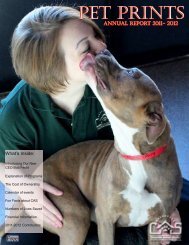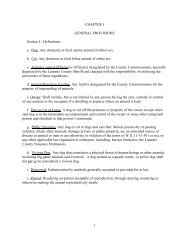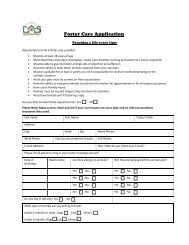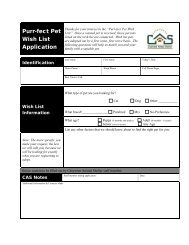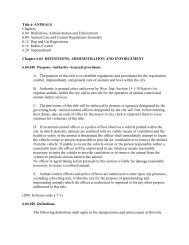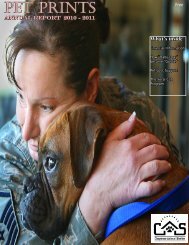Winter 2011 Newsletter - Cheyenne Animal Shelter
Winter 2011 Newsletter - Cheyenne Animal Shelter
Winter 2011 Newsletter - Cheyenne Animal Shelter
Create successful ePaper yourself
Turn your PDF publications into a flip-book with our unique Google optimized e-Paper software.
Holiday and ColdWeather Tips for PetsThe <strong>Winter</strong> Season often brings lotsof activity and excitement, and thereare some things to remember to helpkeep your pets safe this season.It’s best to keep your pet’s diet assimilar as possible throughout theholidays. It can be tempting to give yourpets a holiday feast like your own, butdisrupting their diet can cause stomachupset or even injury. For example,turkey bones are brittle and sharp andshouldn’t be given to dogs to chew on.Desserts like chocolate can be especiallydangerous for dogs.Dogs and cats aren’t always as socialas we think. Sometimes a lot ofnew faces, like those at a party, can bestressful to pets. Consider giving petstheir own, quiet room during get-togethers.This will also keep them safe fromguests feeding them table scraps andfrom escaping through the front door aspeople come and go.Many holiday decorations look likegreat toys, especially to cats. Tinsel,if eaten, can wreck havoc on a cat’sinsides, sometimes requiring surgeryto remove. Christmas trees can fall andinjure curious cats and dogs. Flickeringcandles look like fun toys to some cats.Remember that just because your pethas a fur coat, they are not immuneto the cold weather. The best place forpets is indoors with their owners. If theymust stay outside, ensure they haveadequate shelter from the weather andplenty of food and fresh water.In the News ...Rabies is still hereThe threat of rabies still existsin Laramie County. Beginning lastJanuary, the area has reported severalcases of the disease. It’s the firsttime since before 1984 that LaramieCounty has seen rabies among its wildanimals. So far, the disease has onlybeen discovered in skunks and bats,but it is highly contagious and couldeasily spread to other wild animals,livestock and pets.Rabies is transmitted throughsaliva and mucus. Any contact with arabid animal’s saliva in an open woundor cut or through being bitten cantransmit the disease. It is extremelydeadly to humans and other animals.<strong>Animal</strong>s already vaccinated are saferfrom the disease.It is extremely important thatresidents remain diligent about vaccinatingpets and livestock and keep aneye out for any animals acting sick.Rabid animals can appear disoriented,confused, scared or aggressive.Anyone that comes into contactwith any animal that is behavingstrangely or appears sick should notapproach it and should call <strong>Cheyenne</strong><strong>Animal</strong> Control at 635-1453 immediately.<strong>Cheyenne</strong> <strong>Animal</strong> Control officersare patroling neighborhoods, informingresidents about the rabies riskand writing tickets for non-compliancewith the law requiring rabies vaccinations.<strong>Cheyenne</strong> <strong>Animal</strong> <strong>Shelter</strong> Volunteer ProgramDo you have the time, heart and passion for animals?Our volunteer program may be for you!For more information, call us at: 307-632-6655Page 9



